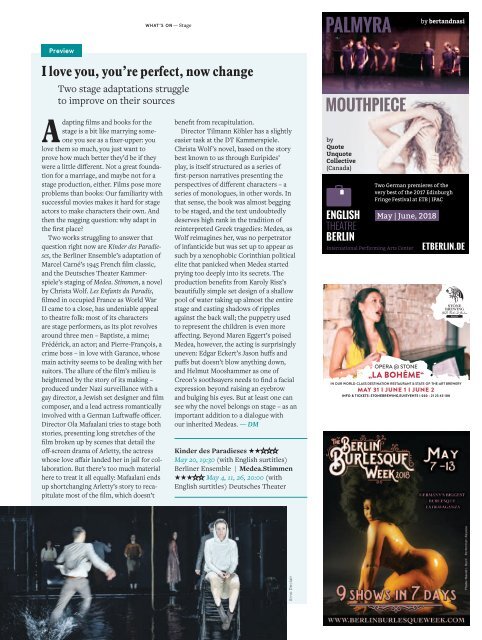You also want an ePaper? Increase the reach of your titles
YUMPU automatically turns print PDFs into web optimized ePapers that Google loves.
WHAT’S ON — Stage<br />
PALMYRA<br />
by bertandnasi<br />
Preview<br />
I love you, you’re perfect, now change<br />
Two stage adaptations struggle<br />
to improve on their sources<br />
Adapting films and books for the<br />
stage is a bit like marrying someone<br />
you see as a fixer-upper: you<br />
love them so much, you just want to<br />
prove how much better they’d be if they<br />
were a little different. Not a great foundation<br />
for a marriage, and maybe not for a<br />
stage production, either. Films pose more<br />
problems than books: Our familiarity with<br />
successful movies makes it hard for stage<br />
actors to make characters their own. And<br />
then the nagging question: why adapt in<br />
the first place?<br />
Two works struggling to answer that<br />
question right now are Kinder des Paradieses,<br />
the Berliner Ensemble’s adaptation of<br />
Marcel Carné’s 1945 French film classic,<br />
and the Deutsches Theater Kammerspiele’s<br />
staging of Medea. Stimmen, a novel<br />
by Christa Wolf. Les Enfants du Paradis,<br />
filmed in occupied France as World War<br />
II came to a close, has undeniable appeal<br />
to theatre folk: most of its characters<br />
are stage performers, as its plot revolves<br />
around three men – Baptiste, a mime;<br />
Frédérick, an actor; and Pierre-François, a<br />
crime boss – in love with Garance, whose<br />
main activity seems to be dealing with her<br />
suitors. The allure of the film’s milieu is<br />
heightened by the story of its making –<br />
produced under Nazi surveillance with a<br />
gay director, a Jewish set designer and film<br />
composer, and a lead actress romantically<br />
involved with a German Luftwaffe officer.<br />
Director Ola Mafaalani tries to stage both<br />
stories, presenting long stretches of the<br />
film broken up by scenes that detail the<br />
off-screen drama of Arletty, the actress<br />
whose love affair landed her in jail for collaboration.<br />
But there’s too much material<br />
here to treat it all equally: Mafaalani ends<br />
up shortchanging Arletty’s story to recapitulate<br />
most of the film, which doesn’t<br />
benefit from recapitulation.<br />
Director Tilmann Köhler has a slightly<br />
easier task at the DT Kammerspiele.<br />
Christa Wolf’s novel, based on the story<br />
best known to us through Euripides’<br />
play, is itself structured as a series of<br />
first-person narratives presenting the<br />
perspectives of different characters – a<br />
series of monologues, in other words. In<br />
that sense, the book was almost begging<br />
to be staged, and the text undoubtedly<br />
deserves high rank in the tradition of<br />
reinterpreted Greek tragedies: Medea, as<br />
Wolf reimagines her, was no perpetrator<br />
of infanticide but was set up to appear as<br />
such by a xenophobic Corinthian political<br />
elite that panicked when Medea started<br />
prying too deeply into its secrets. The<br />
production benefits from Karoly Risz’s<br />
beautifully simple set design of a shallow<br />
pool of water taking up almost the entire<br />
stage and casting shadows of ripples<br />
against the back wall; the puppetry used<br />
to represent the children is even more<br />
affecting. Beyond Maren Eggert’s poised<br />
Medea, however, the acting is surprisingly<br />
uneven: Edgar Eckert’s Jason huffs and<br />
puffs but doesn’t blow anything down,<br />
and Helmut Mooshammer as one of<br />
Creon’s soothsayers needs to find a facial<br />
expression beyond raising an eyebrow<br />
and bulging his eyes. But at least one can<br />
see why the novel belongs on stage – as an<br />
important addition to a dialogue with<br />
our inherited Medeas. — DM<br />
Kinder des Paradieses HH<br />
<strong>May</strong> 20, 19:30 (with English surtitles)<br />
Berliner Ensemble | Medea.Stimmen<br />
HHH <strong>May</strong> 4, 11, 26, 20:00 (with<br />
English surtitles) Deutsches Theater<br />
MOUTHPIECE<br />
by<br />
Quote<br />
Unquote<br />
Collective<br />
(Canada)<br />
etb<br />
International Performing Arts Center<br />
Two German premieres of the<br />
very best of the 2017 Edinburgh<br />
Fringe Festival at ETB | IPAC<br />
<strong>May</strong> | June, <strong>2018</strong><br />
ETBERLIN.DE<br />
Arno Declair<br />
MAY <strong>2018</strong>

















